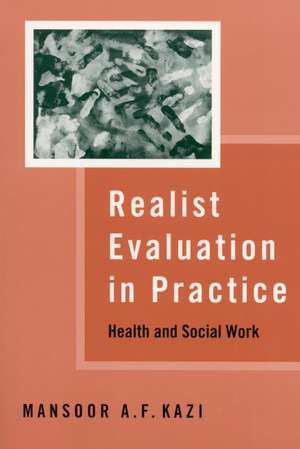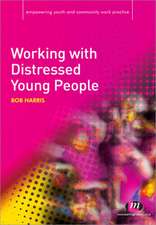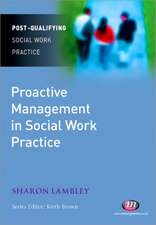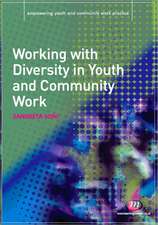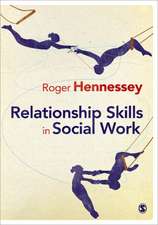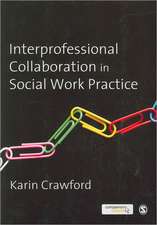Realist Evaluation in Practice: Health and Social Work
Autor Mansoor A F Kazien Limba Engleză Paperback – 17 iun 2003
Realist evaluation is an exciting new way to investigate what works, for whom and in what contexts and here for the first time, Mansoor A F Kazi shows how it applies to today's practice in social work, health and other human services.
To show how realist evaluation has the potential to change practice, the author provides in-depth examples of evaluation in adult rehabilitation, drug-using communities, users of family centres and an NSPCC project that provides services for children who sexually harm other children. Within these instances, realist evaluation procedures were integrated into the practice and decisions regarding the content and the targeting of services were developed effectively.
Written in an engaging style, this book will be of value to social workers and all those engaged in service delivery or research across the spectrum of health and social care.
Preț: 468.95 lei
Preț vechi: 551.71 lei
-15% Nou
Puncte Express: 703
Preț estimativ în valută:
89.73€ • 93.88$ • 74.54£
89.73€ • 93.88$ • 74.54£
Carte tipărită la comandă
Livrare economică 02-16 aprilie
Preluare comenzi: 021 569.72.76
Specificații
ISBN-13: 9780761969969
ISBN-10: 0761969969
Pagini: 180
Ilustrații: 1, black & white illustrations
Dimensiuni: 156 x 234 x 11 mm
Greutate: 0.36 kg
Ediția:First Edition
Editura: SAGE Publications
Colecția Sage Publications Ltd
Locul publicării:London, United Kingdom
ISBN-10: 0761969969
Pagini: 180
Ilustrații: 1, black & white illustrations
Dimensiuni: 156 x 234 x 11 mm
Greutate: 0.36 kg
Ediția:First Edition
Editura: SAGE Publications
Colecția Sage Publications Ltd
Locul publicării:London, United Kingdom
Recenzii
'The strengths of this book are the first two chapters outlining the issues around realist evaluation and the final chapter, as well as the use throughout the book of real-life examples… in conclusion this is a timely introductory text on the methods and methodology of realist evaluation' - Critical Public Health
Cuprins
Introduction
Contemporary Paradigms in Practice Evaluation
The Realist Paradigm in Evaluation
Use of Interpretivist Research Methods in Realist Evaluation
Quantitative Sub-Group Analysis
Evaluation of Family Centres
Quantitative Sub-Group Analysis
Evaluation of an Adult Rehabilitation Unit
Implementing the Realist Effectiveness Cycle
Evaluation of NSPCC's Shield Project
Conclusion
The Development of Realism for Practice
Contemporary Paradigms in Practice Evaluation
The Realist Paradigm in Evaluation
Use of Interpretivist Research Methods in Realist Evaluation
Quantitative Sub-Group Analysis
Evaluation of Family Centres
Quantitative Sub-Group Analysis
Evaluation of an Adult Rehabilitation Unit
Implementing the Realist Effectiveness Cycle
Evaluation of NSPCC's Shield Project
Conclusion
The Development of Realism for Practice
Descriere
'The strengths of this book are the first two chapters outlining the issues around realist evaluation and the final chapter, as well as the use throughout the book of real-life examples… in conclusion this is a timely introductory text on the methods and methodology of realist evaluation' - Critical Public Health
Realist evaluation is an exciting new way to investigate what works, for whom and in what contexts and here for the first time, Mansoor A F Kazi shows how it applies to today's practice in social work, health and other human services.
To show how realist evaluation has the potential to change practice, the author provides in-depth examples of evaluation in adult rehabilitation, drug-using communities, users of family centres and an NSPCC project that provides services for children who sexually harm other children. Within these instances, realist evaluation procedures were integrated into the practice and decisions regarding the content and the targeting of services were developed effectively.
Realist evaluation is an exciting new way to investigate what works, for whom and in what contexts and here for the first time, Mansoor A F Kazi shows how it applies to today's practice in social work, health and other human services.
To show how realist evaluation has the potential to change practice, the author provides in-depth examples of evaluation in adult rehabilitation, drug-using communities, users of family centres and an NSPCC project that provides services for children who sexually harm other children. Within these instances, realist evaluation procedures were integrated into the practice and decisions regarding the content and the targeting of services were developed effectively.
